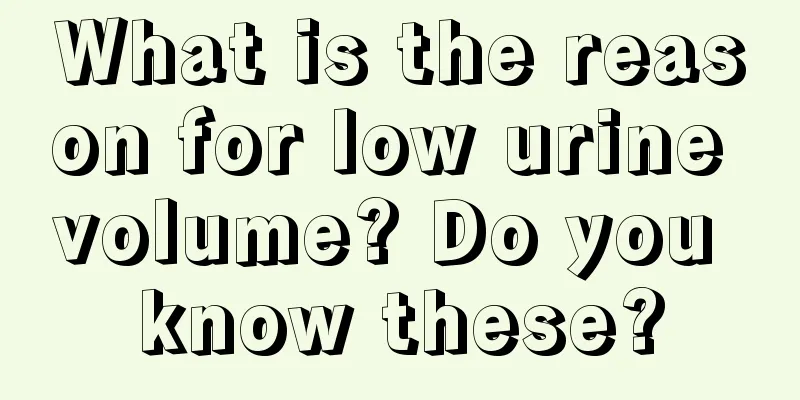What is the reason for low urine volume? Do you know these?

|
Low urine volume is a very serious disease. Many people in life think that low urine volume is no problem and always ignore it. In fact, this will only delay the condition of the body. If a person's daily urine volume is only 500 ml, it is a phenomenon of oliguria. When this phenomenon occurs, you must be alert and pay attention to your body. So what is going on when the body experiences low urine output? (1) Hypovolemia: It starts with functional oliguria and anuria, and the urine volume recovers immediately once the blood volume is replenished. If not diagnosed and treated in time, it may cause organic kidney damage and acute renal failure, manifested as low urine volume and anuria, which is seen in severe dehydration, massive bleeding, large-area burns, etc. (2) Shock: Shock due to various reasons causes a decrease in renal perfusion pressure and a serious deficiency in glomerular filtration rate. It is seen in anaphylactic shock, hemorrhagic shock, cardiogenic shock, infectious and toxic shock, etc. (3) Decreased cardiac output: At this time, the blood supply to the kidneys decreases significantly, which is seen in left heart failure, severe arrhythmias, cardiac tamponade and constrictive pericarditis. (4) Hepatorenal syndrome: In the late stage of cirrhosis, there is severe ascites and severe renal hypoperfusion, which manifests as low urine volume or anuria. Once the ascites of cirrhosis is relieved, the kidneys will recover and the urine volume will increase. 2. Renal low urine output (1) Renal parenchymal damage: Whether it is primary glomerulonephritis or secondary to systemic lupus erythematosus, polyarteritis nodosa, infective endocarditis, dermatomyositis, etc., it can cause renal parenchymal damage and even renal function damage or failure, resulting in low urine output. (2) Renal interstitial disease: The most common drug allergies such as penicillin, sulfonamides, rifampicin, aminoglycoside antibiotics, etc. cause renal interstitial damage. (3) Renal vascular diseases: renal cortical vasospasm or embolism, reduced renal blood supply causing oliguria, seen in disseminated intravascular coagulation, large area burns, etc. 3. Postrenal indigestion is common in cases of urinary tract obstruction such as stones, tumors, prostate hypertrophy or prostate cancer. |
<<: What's wrong with trace urine protein? 7 things you need to pay attention to
>>: Why does the left side of my stomach hurt? Here’s the reason
Recommend
How long can you live with early ovarian cancer
How long can patients with early-stage ovarian ca...
What causes dull pain in the right upper abdomen under the ribs? Is it serious?
The most common cause of dull pain in the right u...
What are the traditional Chinese medicines for treating ovarian cancer
Ovarian cancer is a common disease in our daily l...
Where are the acupuncture points on the shoulders?
When people reach middle age or old age, they oft...
How to quickly supplement estrogen
Hormones are one of the important factors in huma...
What are the general nursing points for lung cancer? 8 key points for lung cancer disease nursing
For any malignant tumor disease, it is a very stu...
What to eat to treat brain cancer
For brain cancer patients, diet can only play a r...
Correction of protruding teeth?
Buck teeth are a very common phenomenon in life, ...
Find out what causes bone cancer
Among many cancer diseases, bone cancer is also a...
How to treat blisters caused by insect bites
We may all have been bitten by insects. Ordinary ...
How to treat stomach cold
Many people often suffer from upper abdominal pai...
Sequelae of brainstem infarction
The brainstem is a key part inside the brain that...
Correctly realize the harm of fibroids
There are relatively many people suffering from f...
What tea is good for indigestion
Drinking tea is not only a culture with a long hi...
How to relieve scalp bleeding
The human cerebral cortex is full of nerves. The ...









